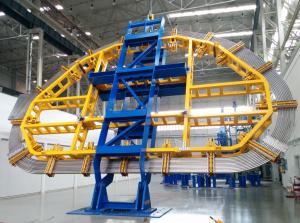Europe signs a final contract for toroidal field coils
2 Jul 2014
In addition to the latest contract, SIMIC S.p.A is producing 35 of the 70 toroidal field radial plates (pictured: tilting operations at the company's facility in Porto Marghera, Italy).
A multimillion-euro contract has been concluded for the last stages of toroidal field coil production between the European Domestic Agency and SIMIC S.p.A, an Italian company specialized in high-tech engineering and manufacturing. The five-year, 100 million euro contract, which covers the cold testing of ten toroidal field winding packs and the insertion of the winding packs into coil cases, effectively concludes European tendering for the production of toroidal field coils. SIMIC has established a collaboration with the German company Babcock Noell GmbH (BNG), which will act as exclusive subcontractor for certain tooling and technologies.
Eighteen D-shaped toroidal field coils—responsible for confining the ITER plasma—will represent over one-fourth of the Tokamak's total weight. Formed of a winding pack and stainless steel coil case, each toroidal field coil will measure 15 metres in height and 9 metres in width and weigh approximately 300 tonnes. Europe has the responsibility for 10 coils (including one spare); Japan is producing another 9. The 19 stainless steel coil cases will be procured by Japan.
"The last and most decisive chapter of toroidal field coil manufacturing is about to be written," exclaimed Henrik Bindslev, director of Fusion for Energy, the European Domestic Agency for ITER. "We will produce magnets of unprecedented size and power following extremely complex techniques. This final procurement is a clear demonstration of Europe's commitment to the project and its capacity to be competitive and meet high technical standards."
Under the contract, the winding packs will be cold tested at -200 degrees Celsius (80 K) using a combined cycle of nitrogen and helium. Next, they will be inserted into the toroidal field coil cases, which will require sophisticated laser dimensional controlled technology and complex tooling in order to move and fit hundreds of tons with millimetre-level precision. Finally the cases will be welded in compliance with stringent standards. Two characteristics will add complexity to the process—the thickness of the weld (up to 130mm) and the fact that welding will have to be carried out only from one side. Ultrasonic technology will be employed to inspect the quality of the welds.
More information and an interview of SIMIC's Marianna Ginola, commercial manager, is available on the European Domestic Agency website.


